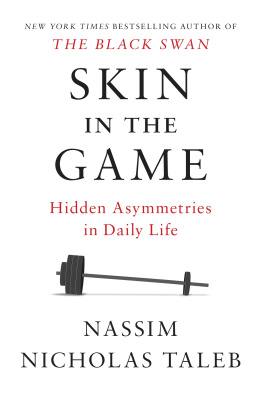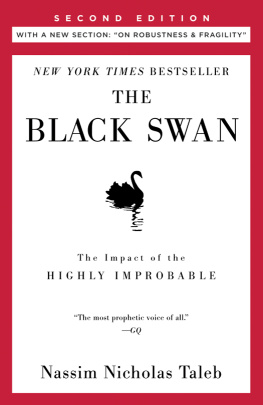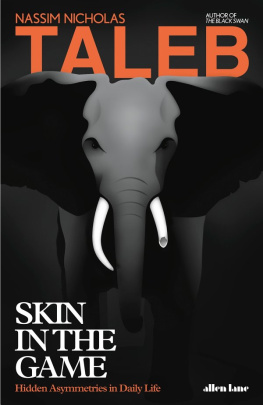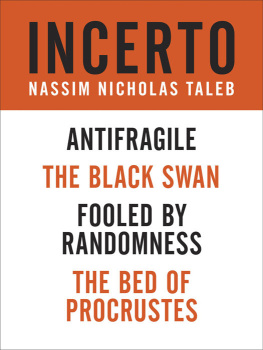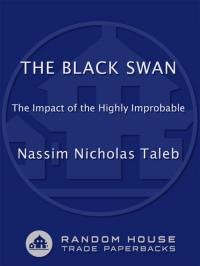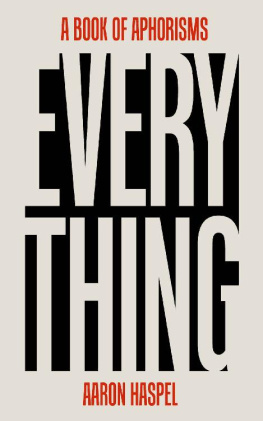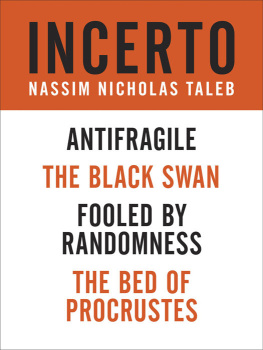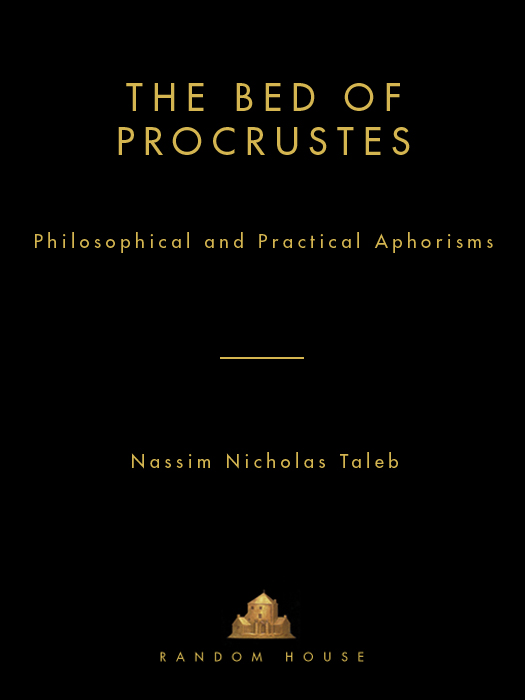A LSO BY N ASSIM N ICHOLAS T ALEB
Fooled by Randomness
The Black Swan
Copyright 2010 by Nassim Nicholas Taleb
All rights reserved.
Published in the United States by Random House, an imprint of The Random House Publishing Group, a division of Random House, Inc., New York.
R ANDOM H OUSE and colophon are registered trademarks of Random House, Inc.
Library of Congress Cataloging-in-Publication Data
Taleb, Nassim.
The bed of Procrustes: philosophical and practical aphorisms /
by Nassim Nicholas Taleb.
p. cm.
eISBN: 978-0-679-64368-5
1. Aphorisms and apothegms. 2. Human behavior
Quotations, maxims, etc. I. Title.
PN6271.T35 2011
818.602dc22
2010036866
www.atrandom.com
v3.1
To A LEXANDER N. T ALEB
CONTENTS
PROCRUSTES
Procrustes, in Greek mythology, was the cruel owner of a small estate in Corydalus in Attica, on the way between Athens and Eleusis, where the mystery rites were performed. Procrustes had a peculiar sense of hospitality: he abducted travelers, provided them with a generous dinner, then invited them to spend the night in a rather special bed. He wanted the bed to fit the traveler to perfection. Those who were too tall had their legs chopped off with a sharp hatchet; those who were too short were stretched (his name was said to be Damastes, or Polyphemon, but he was nicknamed Procrustes, which meant the stretcher).
In the purest of poetic justice, Procrustes was hoisted by his own petard. One of the travelers happened to be the fearless Theseus, who slayed the Minotaur later in his heroic career. After the customary dinner, Theseus made Procrustes lie in his own bed. Then, to make him fit in it to the customary perfection, he decapitated him. Theseus thus followed Herculess method of paying back in kind.
In more sinister versions (such as the one in Pseudo-Apollodoruss Bibliotheca), Procrustes owned two beds, one small, one large; he made short victims lie in the large bed, and the tall victims in the short one.
Every aphorism here is about a Procrustean bed of sortswe humans, facing limits of knowledge, and things we do not observe, the unseen and the unknown, resolve the tension by squeezing life and the world into crisp commoditized ideas, reductive categories, specific vocabularies, and prepackaged narratives, which, on the occasion, has explosive consequences. Further, we seem unaware of this backward fitting, much like tailors who take great pride in delivering the perfectly fitting suitbut do so by surgically altering the limbs of their customers. For instance, few realize that we are changing the brains of schoolchildren through medication in order to make them adjust to the curriculum, rather than the reverse.
Since aphorisms lose their charm whenever explained, I only hint for now at the central theme of this bookI relegate further discussions to the postface. These are stand-alone compressed thoughts revolving around my main idea of how we deal, and should deal, with what we dont know, matters more deeply discussed in my books The Black Swan and Fooled by Randomness.
My use of the metaphor of the Procrustes bed isnt just about putting something in the wrong box; its mostly that inverse operation of changing the wrong variable, here the person rather than the bed. Note that every failure of what we call wisdom (coupled with technical proficiency) can be reduced to a Procrustean bed situation.
PRELUDES
The person you are the most afraid to contradict is yourself.
An idea starts to be interesting when you get scared of taking it to its logical conclusion.
Pharmaceutical companies are better at inventing diseases that match existing drugs, rather than inventing drugs to match existing diseases.
To understand the liberating effect of asceticism, consider that losing all your fortune is much less painful than losing only half of it.
To bankrupt a fool, give him information.
Academia is to knowledge what prostitution is to love; close enough on the surface but, to the nonsucker, not exactly the same thing.
In science you need to understand the world; in business you need others to misunderstand it.
I suspect that they put Socrates to death because there is something terribly unattractive, alienating, and nonhuman in thinking with too much clarity.
Education makes the wise slightly wiser, but it makes the fool vastly more dangerous.
The test of originality for an idea is not the absence of one single predecessor but the presence of multiple but incompatible ones.
Modernitys double punishment is to make us both age prematurely and live longer.
An erudite is someone who displays less than he knows; a journalist or consultant, the opposite.
Your brain is most intelligent when you dont instruct it on what to dosomething people who take showers discover on occasion.
If your anger decreases with time, you did injustice; if it increases, you suffered injustice.
I wonder if those who advocate generosity for its rewards notice the inconsistency, or if what they call generosity is an attractive investment strategy.
Those who think religion is about belief dont understand religion, and dont understand belief.
Work destroys your soul by stealthily invading your brain during the hours not officially spent working; be selective about professions.
In nature we never repeat the same motion; in captivity (office, gym, commute, sports), life is just repetitive-stress injury. No randomness.
Using, as an excuse, others failure of common sense is in itself a failure of common sense.
Compliance with the straitjacket of narrow (Aristotelian) logic and avoidance of fatal inconsistencies are not the same thing.
Economics cannot digest the idea that the collective (and the aggregate) are disproportionately less predictable than individuals.
Dont talk about progress in terms of longevity, safety, or comfort before comparing zoo animals to those in the wilderness.
If you know, in the morning, what your day looks like with any precision, you are a little bit deadthe more precision, the more dead you are.
There is no intermediate state between ice and water but there is one between life and death: employment.
You have a calibrated life when most of what you fear has the titillating prospect of adventure.
Procrastination is the soul rebelling against entrapment.
Nobody wants to be perfectly transparent; not to others, certainly not to himself.
I need a qualifier here. There are exceptions, but there are also many known cases in which a prostitute falls in love with a client.
A generous act is precisely what should aim at no reward, neither financial nor social nor emotional; deontic (unconditional observance of duties), not utilitarian (aiming at some collectiveor even individualgains in welfare). There is nothing wrong with generous acts that elicit a warm glow or promise salvation to the giver; these are not to be linguistically conflated with deontic actions, those emanating from pure sense of duty.
COUNTER NARRATIVES
The best revenge on a liar is to convince him that you believe what he said.
When we want to do something while unconsciously certain to fail, we seek advice so we can blame someone else for the failure.


